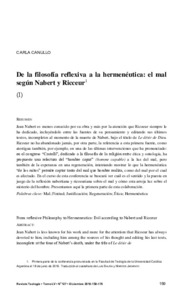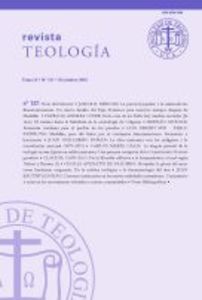Por favor, use este identificador para citar o enlazar este ítem:
https://repositorio.uca.edu.ar/handle/123456789/9327| Título: | De la filosofía reflexiva a la hermenéutica : el mal según Nabert y Ricceur From reflexive philosophy to hermeneutics : evil according to Nabert and Ricceur |
Autor: | Canullo, Carla | Palabras clave: | MAL; FINITUD; JUSTIFICACION; ETICA; HERMENEUTICA; Nabert, Jean, 1881-1960; Ricoeur, Paul, 1913-2005 | Fecha de publicación: | 2018 | Editorial: | Pontificia Universidad Católica Argentina. Facultad de Teología | Cita: | Canullo, C. De la filosofía reflexiva a la hermenéutica : el mal según Nabert y Ricceur [en linea]. Teología. 2018, 55 (127). ISSN: 0328-1396. Disponible en: https://repositorio.uca.edu.ar/handle/123456789/9327 | Resumen: | Resumen:
Jean Nabert es menos conocido por su obra y más por la atención que Ricoeur siempre le
ha dedicado, incluyéndolo entre las fuentes de su pensamiento y editando sus últimos
textos, incompletos al momento de la muerte de Nabert, bajo el título de Le désir de Dieu.
Ricoeur no ha abandonado jamás, por otra parte, la referencia a esta primera fuente, como
atestigua también, por ejemplo, en una de las últimas intervenciones que ha pronunciado:
en el congreso “Castelli”, dedicado a la filosofía de la religión entre ética y ontología, ha
propuesto una relectura del “hombre capaz” (homme capable) a la luz del mal, pero
también de la esperanza en una regeneración, intentando mostrar lo que la hermenéutica
“de los mitos” permite captar tanto del mal que hombre realiza, como del mal por el cual
es afectado. En el curso de esta conferencia se buscará ver cuál es el sentido y la puesta en
juego de la reflexión nabertiana y ricoeuriana sobre el mal y cómo esta arroja luz sobre el
misterio del hombre. Presentamos aquí la primera parte de esta colaboración. Abstract: Jean Nabert is less known for his work and more for the attention that Ricoeur has always devoted to him, including him among the sources of his thought and editing his last texts, incomplete at the time of Nabert’s death, under the title of Le désir de Dieu. Ricoeur has never abandoned, on the other hand, the reference to this first source, as he also attests, for example, in one of the last speeches he has delivered: at the “Castelli” Congress, dedicated to the philosophy of religión between ethics and ontology, he has proposed a rereading of the “capable man” (homme capable) in the light of evil, but also of hope in a regeneration, trying to show what the hermeneutics “of myth” allows to capture both of the evil that man does and the evil by which he is affected. In the course of this conference we will seek to see what is the meaning and the putting into play of Nabert’s and Ricoeur’s reflection on evil and how it sheds light on the mystery of human being. We present here the first part of this collaboration. |
URI: | https://repositorio.uca.edu.ar/handle/123456789/9327 | ISSN: | 0328-1396 | Disciplina: | TEOLOGIA | Derechos: | Acceso abierto | Fuente: | Teología.Tomo LV, Nº 127, 2018 |
| Aparece en las colecciones: | TEO - 2018 Tomo LV nro. 127 |
Ficheros en este ítem:
| Fichero | Descripción | Tamaño | Formato | |
|---|---|---|---|---|
| filosofia-reflexiva-nabert-ricoeur.pdf | 559,35 kB | Adobe PDF |  Visualizar/Abrir | |
| teologia127.jpg | 5 kB | JPEG |  Visualizar/Abrir |
Visualizaciones de página(s)
290
comprobado en 18-feb-2026
Descarga(s)
1.038
comprobado en 18-feb-2026
Google ScholarTM
Ver en Google Scholar
Este ítem está sujeto a una Licencia Creative Commons

